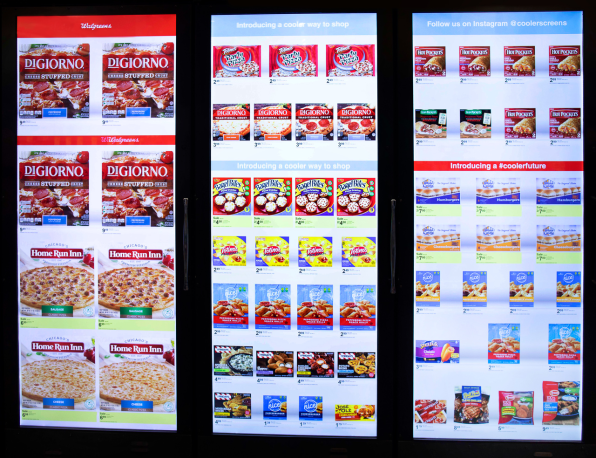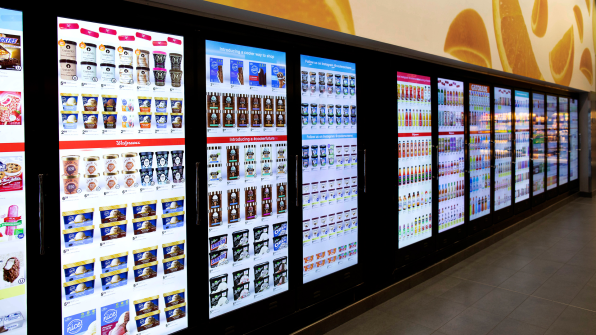Local Pharmacy Near Me- a Video Review of My Best Pharmacy
I walk into a Walgreens just off Marriage Square in New York City that seems, on the surface, to be only like whatsoever other pharmacy. Just as I brand my mode to the dorsum of the store, where there are refrigerators and freezers that shop cold drinks, water ice cream, and other frozen food, the walls start to glow. That'southward because the doors of most of these coolers are no longer the come across-through glass you'd wait: Instead, they're covered with screens that brandish what's behind them using cheery, digital images and flashing promotions.
A homo walks up to the screens, perplexed. "What the fuck is this?" he exclaims to an employee nearby, who is there to solicit feedback on the newfangled freezer doors. She explains briefly. "This is the future," he says in awe.
We live in a surveillance social club, from the cameras that dot many street corners to the constantly tracking phones in our pockets. And soon, even the freezer door at your local convenience store will be tracking you lot too.
A startup named Libation Screens is piloting a new door for commercial freezers and refrigerators that'south equipped with a photographic camera, motion sensors, and middle tracking in 6 Walgreens pharmacies effectually the country, including the one off of Union Square. The doors can discern your gender, your general age range, what products you're looking at, how long you lot're standing there, and fifty-fifty what your emotional response is to a particular product.
The visitor says that the doors don't shop any of this data, which is anonymized, pregnant that it won't know that when you become to your local pharmacy you always purchase ice cream (yet, studies take shown that anonymized data, especially in cities, is possible to de-anonymize). Instead, it volition use the data it's collecting on you lot in real fourth dimension to show you ads and promotions that the algorithm has determined might be relevant to you.
For instance, if a homo is standing in forepart of a cooler where Coke is displaying ads, the cooler might evidence a Coke Zero ad since that item product skews more male, while a woman might see a Diet Coke ad, co-ordinate to Jamie Koval, the company's chief design officer. Similarly, he says, if a twentysomething man was standing in front of the cooler, information technology might show him a Cherry Bull advert, whereas it might testify Koval a Gatorade one, because of their different ages.
Similarly, the doors as well utilise contextual data like the time of day to convince you lot to buy more than. "You could pass by the beer door, and [the door] may detect that you're picking up a vi-pack of Miller Coors," says Libation Screens CEO and cofounder Arsen Avakian. "Information technology's 4 p.1000., and so information technology'southward near dinner time. [It might] offer to you, purchase a DiGiorno pizza for a special price if you're buying a vi-pack of Miller Coors."

The company is as well looking into ways that consumers might opt-in to sharing more detailed information with the organization. For instance, one day you might exist able to indicate in the Walgreens app that y'all similar gluten-free products. Then when you lot walk by a gear up of Cooler Screens in a shop, a screen could highlight the gluten-free options for you lot.
Through its real-time tracking, Cooler Screens is trying to bring the ad-targeting capabilities of the digital world to physical retail. And since the company'south research has shown that 75% of shoppers brand decisions almost what they're going to buy from coolers on impulse, these ads have the potential to impact whether people are going to purchase Häagen-Dazs or Ben and Jerry's–right when they're about to reach for a pint.
That makes Cooler Screens valuable to companies that are fighting for customers' attending on the freezer shelf; so far, the startup has booked advertizing deals with more than 15 of the 20 top consumer packaged goods companies, including Coca-Cola, Pepsi, Nestle, MillerCoors, and Anheuser Busch. Fifty-fifty if a company doesn't choose to advertise with Cooler Screens, their products within the libation will still exist represented on the screen with a life-size image, merely the advertisers can purchase things like banner ads, full-size ads that can take over one total screen or multiple screens, and existent-fourth dimension promotions.
These advertizing deals are the lifeblood of Libation Screens, which doesn't crave pharmacies to buy the doors at all. Instead, Libation Screens retrofits the doors of traditional coolers with its digital ones for gratuitous, and so sells the advertising on those screens. Avakian says that in the kickoff two months of its initial pilot, products that were advertised on Cooler Screens had more than twenty% yr-over-year growth in sales compared to other products.
This isn't just a expert gig for the companies trying to convince you to buy their beer. Libation Screens says it's also benefiting the Walgreens where information technology was first piloted in Chicago, which has seen double-digit, same-store sales growth for the Cooler Screens department every bit compared to the rest of the pharmacy.
The idea for Cooler Screens came straight from the experience of Avakian, who previously started and ran the indie beverage brand Argo Tea. "I've spent hours continuing in forepart of [cooler] doors, observing consumers and their behaviors, and witnessing all the challenges there for . . . a smaller brand [surviving] against larger companies similar the Cokes and Pepsis," he says. "Just every time Argo would have the opportunity to take a little message or sticker, a tag proverb that Argo is organic and not-GMO, nosotros would run across a significant increase in sales."
Plus, coolers are by and large a mess, with products in the wrong places and prices or promotions not clearly visible–if they're there at all. Avakian saw an opportunity to provide a better shopping experience for consumers, targeted advertising for brands anxious to stand out, and better product tracking for grocery and convenience stores, which currently lack an easy way to tell if a libation is out of stock. He teamed up with Greg Wasson, the former president and CEO of Walgreens, and launched in November 2017. Its investors include Microsoft (all of Cooler Screens' technology is built on summit of the Microsoft cloud), Verizon, and Dover, one of the country's largest door manufacturers.

As for consumers, Cooler Screens claims that its flashy screens provide a better shopping experience. But Koval, the head of pattern, was personally worried during the design process that people wouldn't realize they were doors. And so he deliberately designed the interface then that information technology corresponds exactly to what'south on the shelf backside the screen, with subtle details, like having the price tags hang downwardly below each product, that would mimic the freezers people were used to. "The reason we went that route was we wanted to help consumers sympathize the world they were in and not become so far away from that and then that [the interface] seemed similar an operating system or looked as well much like the style you run across your apps on an iPhone," he says.
Still, it'south hard not to see the screens every bit freezer doors as giant iPads (the doors practice have touch-screen chapters, but Koval says information technology hasn't been enabled yet). One woman standing near me at the Matrimony Square Walgreens remarked that she was frustrated when she touched the screen and nothing happened. The feel wasn't equally seamless as promised, either. Ane of the screens was malfunctioning, causing a abiding flicker that ruined the illusion of the long digital shelves. In the ice cream freezer, a whole shelf was mislabeled, with half the items the door promised missing.
As I strolled around the back of the Walgreens, the screens informed me which drinks were nada calorie and which had a discount with a store menu. I learned that Ben & Jerry'south Salted Caramel Cadre is not-GMO, while its Phish Nutrient is kosher. Banner ads for Smart Water flashed as I walked past.
Was I seeing a Smart Water advert because I'm a woman? It's not clear.
That's a problematic lack of transparency. There's no disclosure that users are being watched and their behavior analyzed. When I was looking at the doors, I couldn't find whatever sign of the cameras at all, although I knew they were watching me. When I asked Koval about how he designed the doors and so that people wouldn't find information technology creepy, he pointed again to the fact that the information is anonymized as enough reason for consumers to accept the technology. But these are serious privacy considerations as retail stores bring some of the tracking that already occurs online into the existent globe. Most of us are aware that Facebook is tracking what we "like" on its website, but few would expect to have their emotions monitored at the local chemist's shop.
Ultimately, for consumers who don't want to be targeted, the only way to opt out is to avoid stores that do it. But every bit more and more brick-and-mortar stores install similar applied science, it will be increasingly hard to avert.
Source: https://www.fastcompany.com/90302382/its-not-just-google-or-facebook-the-freezer-aisle-is-ad-targeting-you-too
0 Response to "Local Pharmacy Near Me- a Video Review of My Best Pharmacy"
Post a Comment